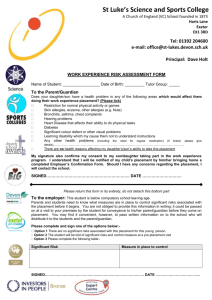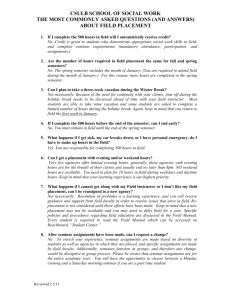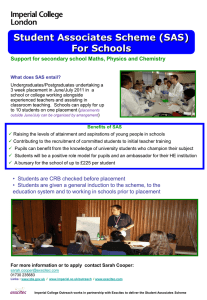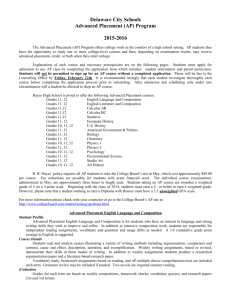Advanced Placement Calculus
advertisement
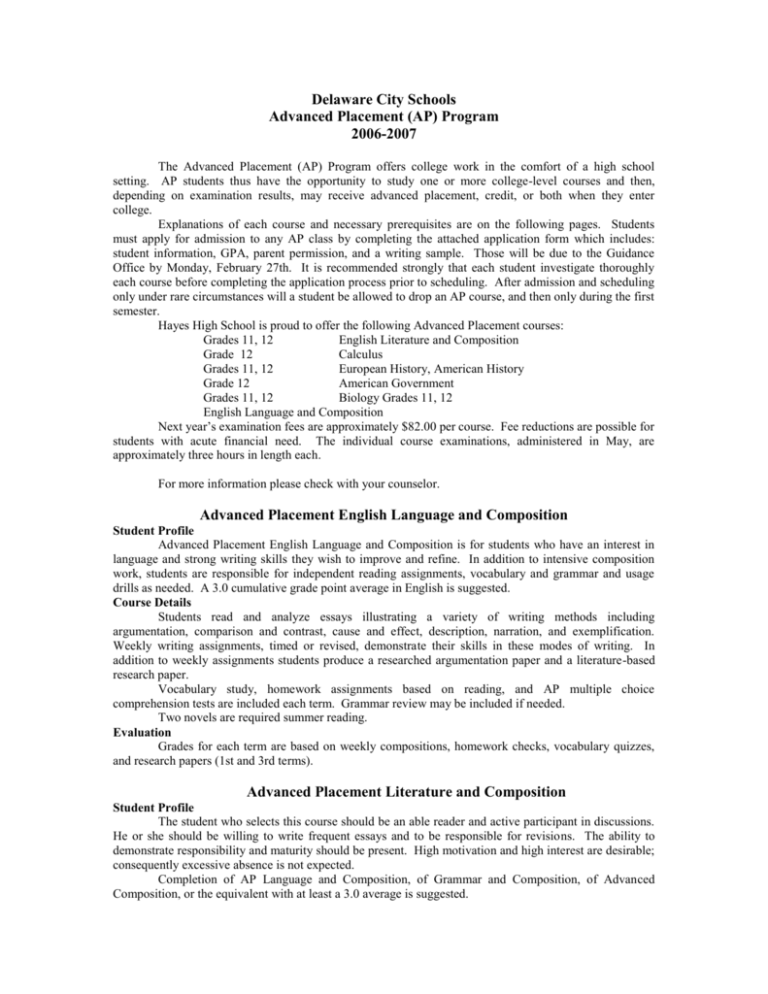
Delaware City Schools Advanced Placement (AP) Program 2006-2007 The Advanced Placement (AP) Program offers college work in the comfort of a high school setting. AP students thus have the opportunity to study one or more college-level courses and then, depending on examination results, may receive advanced placement, credit, or both when they enter college. Explanations of each course and necessary prerequisites are on the following pages. Students must apply for admission to any AP class by completing the attached application form which includes: student information, GPA, parent permission, and a writing sample. Those will be due to the Guidance Office by Monday, February 27th. It is recommended strongly that each student investigate thoroughly each course before completing the application process prior to scheduling. After admission and scheduling only under rare circumstances will a student be allowed to drop an AP course, and then only during the first semester. Hayes High School is proud to offer the following Advanced Placement courses: Grades 11, 12 English Literature and Composition Grade 12 Calculus Grades 11, 12 European History, American History Grade 12 American Government Grades 11, 12 Biology Grades 11, 12 English Language and Composition Next year’s examination fees are approximately $82.00 per course. Fee reductions are possible for students with acute financial need. The individual course examinations, administered in May, are approximately three hours in length each. For more information please check with your counselor. Advanced Placement English Language and Composition Student Profile Advanced Placement English Language and Composition is for students who have an interest in language and strong writing skills they wish to improve and refine. In addition to intensive composition work, students are responsible for independent reading assignments, vocabulary and grammar and usage drills as needed. A 3.0 cumulative grade point average in English is suggested. Course Details Students read and analyze essays illustrating a variety of writing methods including argumentation, comparison and contrast, cause and effect, description, narration, and exemplification. Weekly writing assignments, timed or revised, demonstrate their skills in these modes of writing. In addition to weekly assignments students produce a researched argumentation paper and a literature-based research paper. Vocabulary study, homework assignments based on reading, and AP multiple choice comprehension tests are included each term. Grammar review may be included if needed. Two novels are required summer reading. Evaluation Grades for each term are based on weekly compositions, homework checks, vocabulary quizzes, and research papers (1st and 3rd terms). Advanced Placement Literature and Composition Student Profile The student who selects this course should be an able reader and active participant in discussions. He or she should be willing to write frequent essays and to be responsible for revisions. The ability to demonstrate responsibility and maturity should be present. High motivation and high interest are desirable; consequently excessive absence is not expected. Completion of AP Language and Composition, of Grammar and Composition, of Advanced Composition, or the equivalent with at least a 3.0 average is suggested. Course Details Three novels will be assigned in the spring of the student’s junior year to be completed before the student’s senior year begins. Shorter reading requirements will continue throughout the year, i.e. short stories, poetry, plays. Essay writing based on the reading and discussions that follow will occur frequency in class under timed conditions. Vocabulary drill and multiple-choice testing experience will also enhance the student’s opportunity to score well on the AP exam in May and to succeed in college work. Evaluation The frequent essays are graded, with the privilege of raising the grade through revision. Short recapitulations of authors studied will be required. A final three hour AP exam created and graded by Educational Testing Service will result in an evaluation of college capability and possible college credit but will not affect the grade in this course. Advanced Placement Calculus Student Profile Students who have completed the Pre-Calculus math sequence with at least a 3.0 cumulative grade average in math are eligible to take AP Calculus. Since it is not a subject easily learned on one’s own, regular attendance and consistent study habits are extremely important. It is expected that students will set aside time each day for assignments rather than expecting to devote large blocks of time on a irregular, less frequent schedule. Persistence and the ability to cope with frustration when problems are not “exactly like the examples” is necessary. Most importantly, students should enjoy doing math, not only for the sake of its potential applications, but for the subject itself. Course Details Students will be introduced to the concepts of limits and two branches of Calculus known as differential and integral Calculus. New material is introduced almost daily, and lectures supplement rather than reiterate the text. The pace of the course is fast, though not as fast as college courses. As mentioned above, problems in homework assignments and on tests are often of a non-routine type requiring more in depth analysis, ingenuity, and persistence. (Often times the problems become quite long which then requires neat, organized work habits). Use of proper mathematical notation is stressed, and justification of procedures or conclusions requires writing explanations in complete sentences. Students will need a graphing calculator for this course. It is required for the May exam. Evaluation Grades will be determined by a process agreed upon by teacher and students, however, the major part of grade will be based on tests and quizzes. Tests follow the format of the AP exam which students will take in May: part multiple choice, part free response. A cumulative semester exam is given at the end of the second term. Advanced Placement Biology Student Profile If you apply for this course, you should have a love and appreciation for science and have completed biology with grades A or B, or be enrolled concurrently in chemistry. Course Details There are several required laboratories. At times these labs may involve student free time. At least 2 of these labs require after school participation. The pace of this course is accelerated. The content is divided into three areas of study: 1. Molecular and Cellular Biology a. Chemical Basis of Life b. Cells and Cell Division c. Enzymes d. Photosynthesis/Respiration e. Chemical Nature of the Gene f. Origin of Life 2. Organismal Biology a. Plant Structures and Function b. Plant Reproduction and Development 3. c. Structure and Function of Animals - Dissection d. Animal Reproduction and Development Population Biology a. Heredity - Breeding of Fruit Flies b. Evolution c. Ecology d. Behavior e. Social Biology Evaluation The grade average is based on lab work, quizzes and tests. Scientific essay writing is stressed. The quality of the work is evaluated at the college level. The AP examination is given in May. Advanced Placement European History Student Profile The first priority for students considering this course should be a great enjoyment and appreciation of history. In addition, a record of academic success in the subject area is expected. Due to the extensive amount and the nature of the material covered, reading, writing, note-taking and analysis skills - as well as good study habits - are important. Since many of the topics will be “unknowns” to students and the pace of the class is brisk, regular attendance is imperative. Both the test and primary source collections used are college level. Juniors and Seniors with at least 3.0 average in history may elect this course. Course Details European History covers that time period in modern Europe from 1450 into the 1980’s. The areas are varied and comprehensive: social/cultural and economic developments, as well as the usual politics and diplomacy are studied. A tiny sampling of topics includes: The Renaissance The Reformation Dynastic Development and Warfare: Valois, Tutors, Habsburgs, Bourbons Revolutions; English, French, Russian, Industrial, Intellectual Napoleonic Europe Nationalism, Unification of Italy and Germany New Imperialism: Asia and Africa The Rise of Fascism The Cold War Evaluation Grade for each term will be based on announced quizzes, writing exercises, essay-type exams and 4 topical papers. Advanced Placement United States History Student Profile The first priority for students considering this course should be a great enjoyment and appreciation of history. In addition, a record of academic success in the subject area is expected. Due to the extensive amount and the nature of the material covered, reading, writing, note-taking and analysis skills - as well as good study habits - are important. Since many of the topics will be “unknowns” to students and the pace of the class is brisk, regular attendance is imperative. Both the test and primary source collections used are college level. Juniors and Seniors with at least 3.0 average in history may elect this course. Course Details A.P. American History covers that time period from colonialization to the Mid 1970’s. The areas are varied and comprehensive: social/cultural and economic developments, as well as the usual politics and diplomacy are studied. A sampling of topics includes: Colonialization through American Revolution Federation - Era to War of 1812 Rise of Jackson in Democracy Manifest Destiny to Civil War Rise of Industrialization and Reform Populist Movement to Progressivism Rise of the US as World Power Impact of New Deal World War II to Cold War Civil Rights - 50, 60, 70’s Vietnam War Evaluation Your grade will be based on essay-type exams, announced quizzes, homework, class participation, a clippings file of relevant articles, and a 3-5 page paper each nine weeks. After the AP exam, class presentations and activities may be assigned as well. Advanced Placement United States Government & Politics Student Profile The first priority for students considering this course should be a great enjoyment and appreciation of government and the political process. In addition, a record of academic success in the area of social studies is expected. Due to the extensive amount and the nature of the material covered, reading, writing, note-taking and analysis skills - as well as good study habits - are important. Since many of the topics will be “unknowns” to students and the pace of the class is brisk, regular attendance is imperative. Both the test and primary source collections used are college level. Seniors with at least a 3.0 grade point average in history may elect this course. Course Details This course is about the American political system. We will discuss political ideology, the development of the political system and our democratic institutions. Students will be able to evaluate the role of the national government and its relationship to the concept of liberty in a pluralistic society. The discussions will emphasize the changing political culture of American society and its effect on voting patterns, trends and the processes of government. In doing so we will examine certain critical elections in American history as well as recent political movements. The main thrust of the course, however, is to be able to apply an understanding of our political system to contemporary events. The following five major topics will be covered: (1) The constitutional underpinnings of American government, (2) political beliefs and behaviors, (3) political parties and interest groups, (4) institutions and policy development and, (5) civil liberties. At the conclusion of the course students should have a more sophisticated understanding of majority rule democracy, constitutionalism and civil liberties. Students will also be able to see the relationships and distinctions between formal and informal institutions and the public policies that are developed as a result of these relationships. Evaluation Your grade will be based on essay-type exams, announced quizzes, homework, class participation, a clippings file of relevant articles, and a 3-5 page paper each nine weeks. After the AP exam, class presentations and activities may be assigned as well. 2006-2007 Delaware City Schools Advanced Placement Course Application Due to Guidance Office by February 27, 2006 Name: Home Address: Grade: Phone: AP Course requested: I. Current cumulative grade point average: II. Prerequisites: Please list previous courses taken (or those in which you are currently enrolled) that are required for the course you are requesting (see individual course descriptions for details): Course IV. Final Grade Received Teacher Parent/Guardian Permission: If he/she meets the stated requirements for the above AP class, I grant permission to enroll in this class. I understand that part of the curriculum is taking the AP test in May. If for any reason the AP test is not taken, the course will not count as an AP course toward valedictorian/salutatorian status. The grade will not be weighted. Examination fee is approximately $82.00 per course. Limited scholarship help is available through the principal’s office. Date: V. Signature: Please complete the following writing sample typed, on a separate paper and approximately 250 words in length. There is no writing sample needed for AP Lit. & Comp. Your attached typed response is a part of evaluating your application. IDENTIFY ONE OF YOUR FUTURE GOALS AND EXPLAIN HOW THIS CLASS WILL HELP YOU ACHIEVE IT. This completed application for 2006-2007 scheduling is due in the Guidance Office no later than Feb. 27th. **The AP test fee may be deferred until the end of the first semester**

